- Home
- Peter V. Brett
The Painted Man d-1
The Painted Man d-1 Read online
The Painted Man
( Demon - 1 )
Peter V. Brett
Sometimes there is very good reason to be afraid of the dark…
Eleven-year-old Arlen lives with his parents on their small farmstead, half a day's ride away from the isolated hamlet of Tibbet's Brook.
As dusk falls upon Arlan's world, a strange mist rises from the ground, a mist carrying nightmares to the surface. A mist that promises a violent death to any foolish enough to brave the coming darkness, for hungry corelings - demons that cannot be harmed by mortal weapons - materialize from the vapours to feed on the living. As the sun sets, people have no choice but to take shelter behind magical wards and pray that their protection holds until the creatures dissolve with the first signs of dawn.
When Arlen's life is shattered by the demon plague, he is forced to see that it is fear, rather than the demons, which truly cripples humanity. Believing that there is more to his world than to live in constant fear, he must risk leaving the safety of his wards to discover a different path.
In the small town of Cutter's Hollow, Leesha's perfect future is destroyed by betrayal and a simple lie. Publicly shamed, she is reduced to gathering herbs and tending an old woman more fearsome than the corelings. Yet in her disgrace, she becomes the guardian of dangerous ancient knowledge.
Orphaned and crippled in a demon attack, young Rojer takes solace in mastering the musical arts of a Jongleur, only to learn that his unique talent gives him unexpected power over the night.
Together, these three young people will offer humanity a last, fleeting chance of survival.
Peter V. Brett
The Painted Man
Section I
Tibbet's Brook
319 After the Return
1
Aftermath
319 AR
The great horn sounded.
Arlen paused in his work, looking up at the lavender wash of the dawn sky. Morning mist still clung to the air, bringing with its damp an acrid taste that was all too familiar. A quiet dread built in his gut as he waited in the morning stillness, hoping that it had been his imagination. He was eleven years old.
Again the horn was blown, this second note longer and clearer. Behind Arlen, the door to the house opened, and he knew his mother was there, covering her mouth with both hands. How many times had this happened, that he could picture her reaction so clearly?
There was a pause, and then the horn blew twice in rapid succession. One long and two short meant south and east. The Cluster by the Woods. His father had friends amongst the Cutters.
Arlen returned to his work, not needing to be told to hurry. Some chores could wait a day, but the stock still needed to be fed and the cows milked. He left the animals in the barns and opened the hay stores, slopped the pigs, and ran to fetch a wooden milk bucket. His mother was already squatting beneath the first of the cows. He snatched the spare stool and they found cadence in their work, the sound of milk striking wood drumming a funeral march. As they moved to the next pair down the line, Arlen saw his father begin hitching their strongest horse, a five-year-old chestnut-coloured mare named Missy, to the cart. His face was grim as he worked.
What would they find this time?
Before long, they were in the cart, trundling towards the small cluster of houses by the woods. It was dangerous there; over an hour's run to the next warded structure, but the lumber was needed. Arlen's mother, wrapped in her worn shawl, held him tightly as they rode.
'I'm a big boy, mam,' Arlen complained. 'I don't need you to hold me like a baby. I'm not scared.' It wasn't entirely true, but it would not do for the other children to see him clinging to his mother as they rode in. They made mock of him enough as it was.
'I'm scared,' his mother said. 'What if it's me who needs to be held?'
Feeling suddenly proud, Arlen pulled close to his mother again as they travelled down the road. She could never fool him, but she always knew what to say just the same.
A pillar of greasy smoke told them more than they wanted to know long before they reached the others. They were burning the dead. And starting the fires this early, without waiting for everyone to arrive and pray, meant there were a great many. Too many to pray over each one if the work was to be completed before dusk.
It was more than five miles from Arlen's father's farm to the Cluster by the Woods. By the time they arrived, the few remaining cabin fires had been put out, though in truth there was little left to burn. Fifteen houses; all reduced to rubble and ash.
'The wood piles, too,' Arlen's father said, spitting over the side of the cart. He gestured with his chin towards the blackened ruin that remained of a season's cutting. Arlen grimaced at the thought of how the rickety fence that penned the animals would have to last another year, and immediately felt guilty. It was only wood, after all.
The village speaker approached their cart as it pulled up. Selia, whom Arlen's mother sometimes called Selia the Barren, was a hard old woman, tall and thin, with skin like tough leather. Her long grey hair was pulled into a tight bun, and she wore her shawl like a badge of office. She brooked no nonsense, as Arlen had learned more than once at the end of her stick, but today, he was comforted by her presence. Like Arlen's father, something about Selia made him feel safe. Though she had never had children of her own, Selia acted as a parent to everyone in Tibbet's Brook. Few could match her wisdom, and fewer still her stubbornness. When you were on Selia's good side, it felt like the safest place in the world.
'It's good that you've come, Jeph,' Selia told Arlen's father. 'Silvy and young Arlen, too,' she said, nodding to them. 'We need every hand we can get. Even the boy can help.'
Arlen's father grunted, stepping down from the cart. 'I brought my tools,' he said. 'Just tell me where we can throw in.'
Arlen collected the precious tools from the back of their cart. Metal was scarce in the Brook, and his father was proud of his two shovels, his pick and his saw. They would all see heavy use this day.
'Twenty-seven,' Selia said, giving Arlen's parents the number they feared to ask for. Silvy choked and covered her mouth, tears welling in her eyes. Jeph spat again.
'Any survivors?' he asked.
'A few,' Selia said. 'Manie,' she pointed with her stick at a boy who stood staring at the funeral pyre, 'ran all the way to my house in the dark.'
Silvy gasped. No one had ever run so far and lived. 'The wards on Brine Cutter's house held for most of the night,' Selia went on. 'He and his family watched everything. A few others fled the corelings and succoured there, until the fires spread and their roof caught. They waited in the burning house until the beams started to crack, and then took their chances outside in the minutes before dawn. The corelings killed Brine's wife Meena and their son Poul, but the others made it. The burns will heal and the children will be all right in time, but the others…'
She didn't need to finish the sentence. Survivors of a demon attack had a way of dying soon after. Not all, or even most, but enough. Some of them took their own lives, and others simply stared blankly, refusing to eat or drink until they wasted away. It was said you did not truly survive an attack until a year and a day had passed.
'There are still a dozen unaccounted for,' Selia said, but with little hope in her voice.
'We'll dig them out,' Jeph agreed grimly, looking at the collapsed houses, many still smouldering. The Cutters built their homes mostly out of stone to protect against fire, but even stone would burn if enough flame demons gathered in one place and the wards failed.
Jeph joined the other men and a few of the stronger women in clearing the rubble and carting the dead to the pyre. The bodies had to be burned, of course. No one would want to be buried in the same ground the demons rose
out of each night. Tender Harral, the sleeves of his robe rolled up to bare his thick arms, lifted each into fire himself, muttering prayers and drawing wards in the air as the flames took them.
Silvy joined the other women in gathering the younger children and tending to the wounded under the watchful eye of the Brook's Herb Gatherer, Coline Trigg. But no herbs could ease the pain of some of the survivors. Brine Cutter, also called Brine Broadshoulders, was a great bear of a man with a booming laugh who used to throw Arlen into the air when they came to trade for wood. Now Brine sat in the ashes beside his ruined house, slowly knocking his head against the blackened wall. He muttered to himself and clutched his arms tightly, as if cold.
Arlen and the other children were put to work carrying water and sorting through the woodpiles for salvageable lumber. There were still a few warm months left to the year, but there would not be time to cut enough wood to last the winter. They would be burning dung again this year, and the house would reek.
Again Arlen weathered a wave of guilt. He was not in the pyre, nor banging his head in shock, having lost everything. There were worse fates than a house smelling of dung.
More and more villagers arrived as the morning wore on. Bringing their families and whatever provisions they could spare, they came from Fishing Hole and Town Square; they came from the Boggin's Hill, and Soggy Marsh. Some even came all the way from Southwatch. And one by one, Selia greeted them with the grim news and put them to work.
With more than a hundred hands, the men doubled their efforts, half of them continuing to dig as the others descended upon the only salvageable structure left in the cluster: Brine Cutter's house. Selia led Brine away, somehow supporting the giant man as he stumbled, while the men cleared the rubble and began hauling new stones. A few took out warding kits and began to paint fresh wards while children made thatch. The house would be restored by nightfall.
Arlen was partnered with Cobie Fisher in hauling wood. The children had amassed a sizeable pile, though it was only a fraction of what had been lost. Cobie was a tall, thickly built boy with dark curls and hairy arms. He was popular amongst the other children, but it was popularity built at others' expense. Few children cared to weather his insults, and fewer still his beatings.
Cobie had tortured Arlen for years, and the other children had gone along Jeph's farm was the northernmost in the Brook, far from where the children tended to gather in Town Square, and Arlen spent most of his time wandering the Brook by himself. Sacrificing him to Cobie's wrath seemed a fair trade to most children.
Whenever Arlen went fishing, or passed by Fishing Hole on the way to Town Square, Cobie and his friends seemed to hear about it, and were waiting in the same spot on his way home. Sometimes they just called him names, or pushed him, but other times he came home bloody and bruised, and his mother shouted at him for fighting.
Finally, Arlen had enough. He left a stout stick hidden in that spot, and the next time Cobie and his friends pounced, Arlen pretended to run, only to produce the weapon as if from thin air and come back at them swinging.
Cobie was the first one struck, a hard blow that left him crying in the dust with blood running from his ear. Willum had received a broken finger, and Gart walked with a limp for over a week. It had done nothing to improve Arlen's popularity amongst the other children, and Arlen's father had caned him, but the other boys never bothered him again. Even now, Cobie gave him a wide berth and flinched if Arlen made a sudden move, even though he was bigger by far.
'Survivors!' Bil Baker called suddenly, standing by a collapsed house at the edge of the Cluster. 'I can hear them trapped in the root cellar!'
Immediately, everyone dropped what they were doing and rushed over. Clearing the rubble would take too long, so the men began to dig, bending their backs with silent fervour. Soon after, they broke through the side of the cellar, and began hauling out the survivors. They were filthy and terrified, but all were very much alive: Three women, six children, and one man.
'Uncle Cholie!' Arlen cried, and his mother was there in an instant, cradling her brother, who stumbled drunkenly. Arlen ran to them, ducking under his other arm to steady him.
'Cholie, what are you doing here?' Silvy asked. Cholie seldom left his workshop in Town Square. Arlen's mother had told the tale a thousand times of how she and her brother had run the farrier's shop together before Jeph began breaking his horses' shoes on purpose for a reason to come court.
'Came to court Ana Cutter,' Cholie mumbled. He pulled at his hair, having already torn whole clumps free. 'We'd just opened the bolt hole when they came through the wards…' His knees buckled, pulling Arlen and Silvy down with his weight. Kneeling in the dust, he wept.
Arlen looked at the other survivors. Ana Cutter wasn't among them. His throat tightened as the children passed. He knew every one of them; their families, what their houses were like inside and out, their animals' names. They met his eyes for a second as they went by, and in that moment, he lived the attack through their eyes. He saw himself shoved into a cramped hole in the ground while those unable to fit turned to face the corelings and the fire. Suddenly he started gasping, unable to stop until Jeph slapped him on the back and brought him to his senses.
They were finishing a cold midday meal when a horn sounded on the far side of the Brook.
'Not two in one day?' Silvy gasped, covering her mouth.
'Bah,' Selia grunted. 'At midday? Use your head, girl!'
'Then what…?'
Selia ignored her, rising to fetch a horn blower to signal back. Keven Marsh had his horn ready, as the folks from Soggy Marsh always did. It was easy to get separated in the marshes, and no one wanted to be wandering lost when the swamp demons rose. Keven's cheeks inflated like a frog's chin as he blew a series of notes.
'Messenger horn,' Coran Marsh a greybeard advised Silvy. A greybeard, he was Speaker for Soggy Marsh and Keven's father. Arlen didn't know him, so he was a Marsh or a Watch.
They tended to keep to themselves. 'They prob'ly saw the smoke. Keven's telling 'em what's happened and where everyone is.'
'A Messenger in spring?' Arlen asked. 'I thought they come in the fall after harvest. We only finished planting this past moon!'
'Messenger never came last fall,' Coran said, spitting foamy brown juice from the root he was chewing through the gap of his missing teeth. 'We been worried sumpin' happened. Thought we might not have a Messenger bring salt till next fall. Or maybe that the corelings got the Free Cities and we's cut off.'
"The corelings could never get the Free Cities,' Arlen said.
'Arlen, shush your mouth!' Silvy hissed. 'He's your elder!'
'Let the boy speak,' Coran said. 'Ever bin to a free city, boy?' he asked Arlen.
'No,' Arlen admitted.
'Ever know anyone who had?'
'No,' Arlen said again.
'So what makes you such an expert?' Coran asked. 'Ent no one been to one 'cept the Messengers. They're the only ones what brave the night to go so far. Who's to say the Free Cities ent just places like the Brook? If the corelings can get us, they can get them, too.'
'Old Hog is from the Free Cities,' Arlen said, referring to Rusco Hog, the richest man in the Brook. Hog ran the general store, which was the crux of all commerce in Tibbet's Brook.
'Ay,' Coran said, 'an' Old Hog told me years ago that one trip was enough for him. He meant to go back after a few years, but said it wasn't worth the risk. So you ask him if the Free Cities are any safer than anywhere else.'
Arlen didn't want to believe it. There had to be safe places in the world. But again the image of himself being thrown into the cellar flashed across his mind, and he knew that nowhere was truly safe at night.
The Messenger arrived an hour later. He was a tall man in his early thirties, with cropped brown hair and a short, thick beard.
Draped about his broad shoulders was a shirt of metal links, and he wore a long dark cloak with thick leather breeches and boots. His mare was a sleek brown courser. Strapped t
o the horse's saddle was a harness holding a number of different spears. His face was grim as he approached, but his shoulders were high and proud. He scanned the crowd and spotted the Speaker easily as she stood giving orders. He turned his horse towards her.
Riding a few paces behind on a heavily laden cart pulled by a pair of dark brown mollies, was the Jongleur. His clothes were a brightly coloured patchwork, and he had a lute resting on the bench next to him. His hair was a colour Arlen had never seen before, like a pale carrot, and his skin was so fair it seemed the sun had never touched it. His shoulders slumped, and he looked thoroughly exhausted.
There was always a Jongleur with the annual Messenger. To the children, and some of the adults, the Jongleur was the more important of the two. This one was younger than the last one Arlen remembered, and he seemed sullen, where the other man had been anything but. Children ran to him immediately, and the young Jongleur perked up, the frustration melting from his face so quickly Arlen began to doubt it was ever there. In an instant, the Jongleur was off the cart and spinning his coloured balls into the air as the children cheered.
Others, Arlen among them, forgot their work, drifting towards the newcomers. Selia whirled on them, having none of it. 'The day is no longer because the Messenger's come!' she barked. 'Back to your work!'
There were grumbles, but everyone went back to work. 'Not you, Arlen,' Selia said, 'come here.' Arlen pulled his eyes from the Jongleur and went to her as the Messenger arrived.
'Selia Barren?' the Messenger asked.
'Just Selia will do,' Selia replied primly. The Messenger's eyes widened, and he blushed, the tops of his pale cheeks turning a deep red above his beard. He leaped down from his horse and bowed low.
'Apologies,' he said. 'I did not think. Graig, your usual Messenger, told me that's what you were called.'
'It's pleasing to know what Graig thinks of me after all these years,' Selia said, sounding not at all pleased.

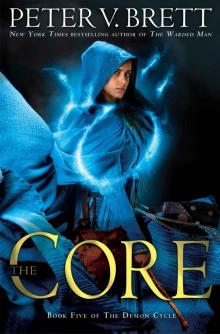 The Core
The Core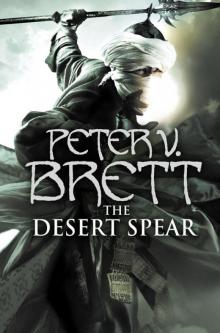 The Desert Spear
The Desert Spear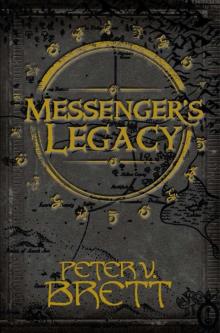 Messenger’s Legacy
Messenger’s Legacy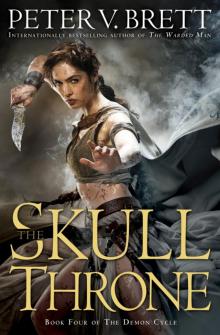 The Skull Throne
The Skull Throne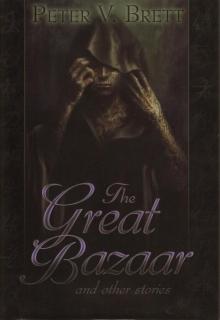 The Great Bazaar and Other Stories
The Great Bazaar and Other Stories The Daylight War
The Daylight War The Desert Prince
The Desert Prince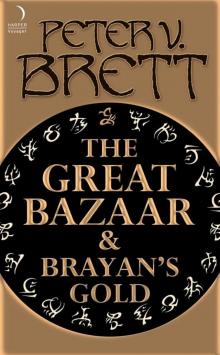 The Great Bazaar & Brayan's Gold
The Great Bazaar & Brayan's Gold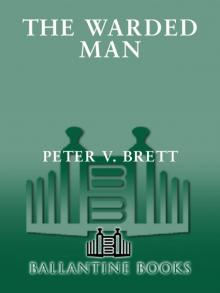 The Warded Man
The Warded Man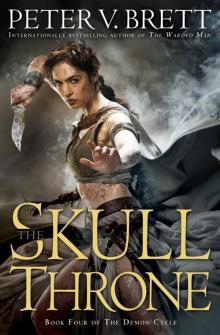 Demon Cycle 04 - The Skull Throne
Demon Cycle 04 - The Skull Throne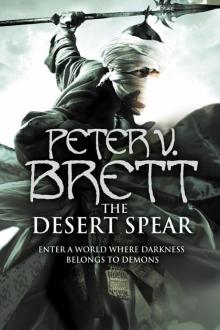 The Desert Spear (demon)
The Desert Spear (demon)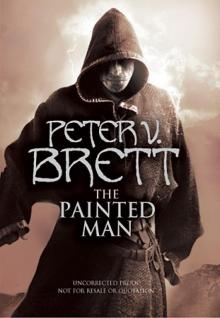 The Painted Man d-1
The Painted Man d-1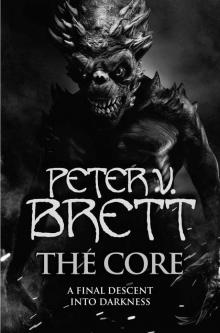 The Core (The Demon Cycle, Book 5)
The Core (The Demon Cycle, Book 5)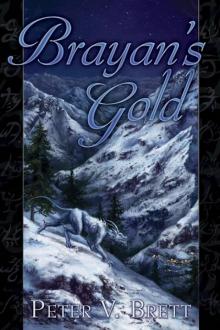 Brayan's Gold
Brayan's Gold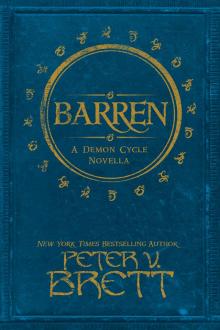 Barren
Barren